Blogging about my mental health
A few weeks ago had an internet date. Of sorts. Not a romantic first date (thank goodness) but a face-to-face meeting with someone I met online. Someone like me in lots of ways. Someone who could be a friend.
We knew a lot about each other’s vulnerabilities and fears before we set eyes on each other. And that made things much easier. The conversation could get right to the good stuff. We could be open and honest. We chatted about medication, work, diagnoses, panic attacks, weddings and how our dogs help with our mental health. Not really first date fodder.
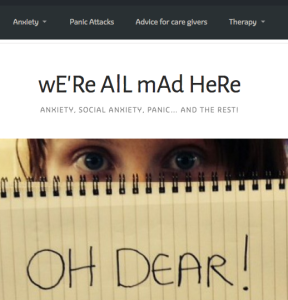 It’s all down to our blogs. Claire writes WE’Re AlL mAd HeRe about social anxiety (she’s also been asked to write a book about anxiety based on her blog – wow). She got in touch a few months ago and suggested lunch. I’m so glad she did. Meeting inspiring new people is just one of the things that blogging has done for me.
It’s all down to our blogs. Claire writes WE’Re AlL mAd HeRe about social anxiety (she’s also been asked to write a book about anxiety based on her blog – wow). She got in touch a few months ago and suggested lunch. I’m so glad she did. Meeting inspiring new people is just one of the things that blogging has done for me.
I’ve had a number of readers get in touch with me recently about starting a mental health blog – overcoming those demons of uncertainty that whisper ‘what’s the point, who cares what I have to say?’
I know the feeling – I have it about writing fiction. But I thought I’d share a little about what blogging has done for me – and a few things that helped me get started.
Why write a mental health blog?
…an opportunity to listen to others
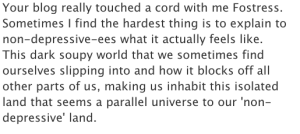 Strangers have got in touch with me to ask about support options or just to get their story down in words and know that someone who understands will listen. That’s a powerful thing and I feel honoured that anyone feels comfortable talking to me about the things they find hardest. I’ve done my best to reply to everyone.
Strangers have got in touch with me to ask about support options or just to get their story down in words and know that someone who understands will listen. That’s a powerful thing and I feel honoured that anyone feels comfortable talking to me about the things they find hardest. I’ve done my best to reply to everyone.
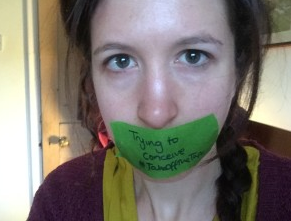 Friends and family have been able to rant, cry or be their most vulnerable selves with me. And I with them. And I know that’s partly because my blogs mean they’ve known me at my darkest when I’m scared and struggling.
Friends and family have been able to rant, cry or be their most vulnerable selves with me. And I with them. And I know that’s partly because my blogs mean they’ve known me at my darkest when I’m scared and struggling.
I recently wrote about Obsessive Compulsive Disorder for Mind. It’s a good example of the power of speaking out honestly – even if it can be embarrassing or anxiety provoking at times.
People often wait over 10 lonely years and until they reach crisis point before they seek help for OCD. Often that’s because they don’t even realise that the thoughts and moods they are struggling with are things they can get help with. OCD is not the only mental health problem that leaves people isolated and uncertain. If more people spoke openly about their experiences (like this brave lady) then they would be recognised and normalised.
…many more open conversations with friends and family.
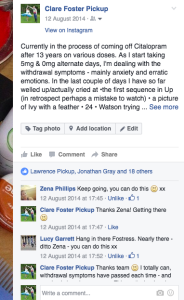
It’s not just about helping others but about talking more openly. In the last few years I have been able to have many more conversations about mental health.
Mental health and the way it tangles into everyday life is complicated and the subtleties are difficult to explain. Having elements of my experience explored and pinned down in words means that when we chat we can go into more detail – or talk about something completely different – and there’s a richness to the conversation, a foundation of shared understanding. Mental health is part of the threads of our experience but it’s woven into the bigger picture.
These conversations help us recognise that it’s part of what makes a life but, even when times are really hard, there’s more to us all. I hope that helps reduce stigma too.
…work
This is probably more to do with my work and projects section – but I think the two are closely connected. The way my blog has developed means it has become a mixture of personal and professional pieces. But, as I wrote in Standing up to stigma – why I write about my work projects and mental health in the same place, I’m happy with that..
…new friends
 The online mental health community is incredibly supportive. I’ve met amazing people like Claire Eastham, Mark Brown and Joe Roberson through my writing. Sometimes these are people I end up meeting face to face, other times I just chat on twitter, reading and sharing their words too. Online responses to a plea for help, a hug or some reassurance have made a huge difference during lonelier times.
The online mental health community is incredibly supportive. I’ve met amazing people like Claire Eastham, Mark Brown and Joe Roberson through my writing. Sometimes these are people I end up meeting face to face, other times I just chat on twitter, reading and sharing their words too. Online responses to a plea for help, a hug or some reassurance have made a huge difference during lonelier times.
…perspective
Before I wrote this I started scrolling through some of my posts from the last year. It helped me remember how unwell I’ve been, and (even if things are still tricky sometimes) how far I’ve come.
How do I get started?
…overcome those demons
There will never be too many people talking openly about mental health. Your experiences are important and your words will add unique threads to the tapestry of life experiences online. Stories can create and communicate emotion, help people understand and share experiences and inspire action. If nothing else, write for yourself. Write for perspective and explore new ideas. Create a narrative that helps you make sense of your life. And remember one of my favourite writing quotes:
I can edit crap, I can’t edit blank
…better done than perfect
My other favourite quote is ‘better done than perfect’. Write to find your way. Your blog will change as you do. You’ll probably look back and want to edit old posts. You can if you like. Or you can leave them as a record of who you were then. My blog has developed organically into a mix of work and personal experiences. It’s a bit of a muddle but it works for me. You don’t have to have it all planned out before you start.
…try a vlog
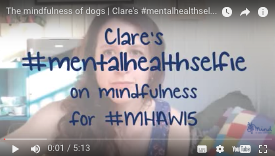 Not everyone communicates best via writing. If you prefer to talk, you could start a vlog. Jonny Benjamin recently wrote a post on the Mental Elf about how vlogging helped him. Mind are always on the look out for ‘mentalhealthselfies‘.
Not everyone communicates best via writing. If you prefer to talk, you could start a vlog. Jonny Benjamin recently wrote a post on the Mental Elf about how vlogging helped him. Mind are always on the look out for ‘mentalhealthselfies‘.
Here’s one I tried. It was fun, but I definitely prefer writing.
…start slowly
Write some posts offline first. Read some other blogs. Try an introduction post and see how that goes. Or how about a letter to yourself or someone else? It might help you work out what you want to say and how you want to say it. You might find it hard to be completely open at first. That’s fine. Go with what you’re happy to share.
You can also start slowly online. Not many people will find your blog at first – unless you publicise it. So you can publish a few posts quietly while you work out where you’re going. It takes time to build followers and an online presence – sometimes years – but keep posting regularly if you can.
…write for charities
Lots of mental health charities are interested in sharing your stories on their own blog. Mind and Sane are good examples. You can have a go doing this first – or you can write something that also links to your blog – and link back to their site too. The more links there are to your blog online (especially ones that go both ways) the more google likes it.
…share and chat
The first time you share a post is scary – but it can also be affirming and e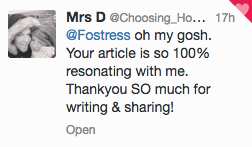 xhilarating when others respond to your words. If you’re not feeling up to posting it on Facebook yet, use Twitter. On Twitter you can share using hashtags, you can tag people or charities you think might be interested and start conversations with people who are talking about mental health.
xhilarating when others respond to your words. If you’re not feeling up to posting it on Facebook yet, use Twitter. On Twitter you can share using hashtags, you can tag people or charities you think might be interested and start conversations with people who are talking about mental health.
Accounts like @MHChat hold regular twitter debates and conversations that you can get involved in. Here’s an example of a post I wrote about motivation after one such chat. Pinterest, Google+, Instagram and Reddit all have mental health communities and tags you can use to share and chat. Ask questions in your blog and reply to comments. Read, follow and comment on other mental health blogs you like. Some of them may accept your posts as guest blogs – ask!
Those are my thoughts and experiences. What has worked for you? What are your favorite mental health blogs. Share your favorites and your own here…


I’ve been struggling with mental health as last number of years,everytime wgen i feel that I’ve got over it something triggers it again.Me and my girlfriend of 4 years broke up and it’s been difficult since but that hasn’t been the reason for my latest episode.On Friday night I thought about taking my own life,the only thing that stopped me was my family and friends who I would leave behind,it would be an extremely selfish act and that’s why I need to get help….thanks to anyone who reads this
Hi Niall,
Sorry you have been having such a difficult time – it sounds really hard. Have you had a look at Mind’s info on suicidal feelings – it might help a little – http://www.mind.org.uk/information-support/types-of-mental-health-problems/suicidal-feelings/#.WLF4HGSLTpA.
You might also find it helpful to have a look at Mind’s info on seeking help for a mental health problem – http://www.mind.org.uk/information-support/guides-to-support-and-services/seeking-help-for-a-mental-health-problem/#.WLF4qmSLTpA – there’s lots of info and support there which you might find useful.
Lastly, have you heard of Elefriends. It’s an online mental health community – really friendly and a good place to share what you’re going through and get support – take a look here – https://www.elefriends.org.uk/
Take very good care of yourself – there are people out there who can help you.
Hugs,
Clare
Very nice and informative blog about mental health it is very good.